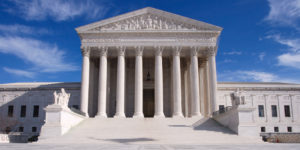Workplace Discrimination Protections Extended to LGBTQ Workers: Five Action Items & Five Predictions for Employers
June 22, 2020 by

Last week the U.S. Supreme Court decided in the groundbreaking opinion, Bostock v. Clayton County, Georgia, that gay and transgender applicants and employees are protected from workplace discrimination under Title VII of the Civil Rights Act of 1964. Historically, Title VII prohibits employment discrimination based upon race, color, religion, sex, or national origin. As a result of Bostock, terminating someone’s employment on the basis of being gay or transgender is now considered “sex” discrimination under Title VII.
In Bostock, the Supreme Court addressed three separate cases in which employees claimed they were discriminated on the basis of being gay or transgender, and that such discrimination qualified as “sex” discrimination under Title VII. Prior to last week’s ruling most court observers reasonably saw the possibility that the Supreme Court would punt the issue to Congress, as it was Congress that created Title VII over fifty years ago. The Court nevertheless surprised many onlookers—through an opinion equally, unexpectedly penned by Justice Gorsuch—and expanded the Title VII definition of “sex” to include sexual orientation and transgender status.
The key factor in the Court reaching this conclusion is its interpretation of the phrase “because of.” The Court applied the phrase to mean “that a defendant cannot avoid liability just by citing some other factor that contributed to its challenged employment action.” It does not matter if other factors besides the person’s sex contributed to the decision because “if changing the employee’s sex would have yielded a different choice by the employer—a statutory violation has occurred.”
The Court also stated that “an employer cannot escape liability by demonstrating that it treats males and females comparably as groups” because “even if the employer is willing to subject all male and female homosexual or transgender employees to the same rule” any such decision is still based in part of the person’s sex. As an example, the Court offered that since “an employer who fires both Hannah and Bob for failing to fulfill traditional sex stereotypes doubles rather than eliminates Title VII liability, an employer who fires both Hannah and Bob for being gay or transgender does the same.”
From a practical standpoint, business owners and employers are asking what this means for their businesses, employer-employee relationships, risk management, and day-to-day processes. Considering this historic case, provided below are five action items for employers and five predictions:
Five Action Items for Employers:
- Appreciate that employment decisions that treat gay, lesbian, and transgender applicants and employees differently likely violate Title VII. The trickle-down of Supreme Court law to day-to-day business is not always seamless. Employers must educate their workforces of this massive change in the law. Likewise, employers must know whether the law applies to them, especially small businesses. All employers with fifteen or more employees are now subject to this federal law; however, employers with fourteen or less employees are not subject to Title VII or the changes under Bostock.
- Promptly update your company handbook and written policies. Given the Supreme Court’s broad interpretation of the phrase “because of,” an employer should carefully review and likely revise its policies and procedures.
- Train your team regarding hiring and employment practices with Bostock, especially HR, executives, and managers who participate in the employment and management processes. As an initial matter, a business should provide training to any officers, executives, or employees involved in the hiring process. Title VII protections extend not only to employees, but also job applicants. A common source of litigation comes from allegations that an employer failed to hire an applicant based on a protected classification. An employer’s hiring practices should prevent and expressly prohibit any consideration of a person’s sexual orientation or transgenderism as part of the hiring decision.
- Protect against and correct workplace harassment of protected individuals. An employer can face liability for the actions of a rogue or untrained supervisor. The employer should exercise reasonable care to prevent and promptly correct any discriminatory or harassing behavior. As a result of the Bostock decision, this responsibility to prevent and correct harassing behavior may now extend to discrimination and harassment based on sexual orientation or transgenderism.
- Understand that an employee or job applicant may also pursue a retaliation claim under this newly expanded definition of sex discrimination. A significant mistake made by employers that commonly leads to litigation is to retaliate against an employee after a complaint is made. In fact, retaliation is the most frequently alleged reason for discrimination, according to the EEOC. Retaliatory treatment typically stems from differing treatment, demotions, transfers, harassment, or even discharge of employment in response to an employee or applicant asserting their rights under federal law. Moreover, protection from retaliation does not simply extend to the alleged victim, but also to witnesses, communications about discrimination, resisting discriminatory treatment, resisting participating in discriminatory treatment, or simply participating in the complaint process. Employers should enforce a strict anti-retaliation environment, where employees are free to complain about discriminatory treatment or harassment without fear of unlawful retaliation. Of course, this protection from retaliation now extends to complaints or participating in the complaint process for sex discrimination based on sexual orientation and transgender status.
Five Post-Bostock Predictions:
- Bostock left a lot to unpack. The Supreme Court stayed narrowly focused on the inclusion of sexual orientation under Title VII sex discrimination but avoided other topics of immediate next concern. The Court did not address the logical, legal consequences of this decision—namely, the legality of sex-specific bathrooms, locker rooms, and dress codes. In fact, the employers in this case specifically raised these concerns to the Court. However, the Supreme Court merely stated that such concerns were not at issue and added that Title VII does “not purport to address bathrooms, locker rooms, or anything else of the kind.” Of course, one must ask whether an employer violated Title VII by disciplining an employee for violating a policy related to sex-specific bathrooms or dress codes. Using the logic applied in this decision, if a man and a woman both refuse to wear a necktie, and only the man is disciplined, he has arguably been disciplined “because of” his sex.
- A wave of litigation is coming. Employers should expect to see an increase of employees and applicants filing charges of discrimination with the EEOC, as well as increased employment litigation due to these new protections. The reasons will be three-fold: first, the wider path to the courthouse, i.e., the expansion of the definition of sex; second, there will be spin-off litigation addressing bathrooms, locker rooms, dress codes, and similar issues; and third, society appears more primed to entertain these cases as compared to any other time in American history.
- Expect an expansion of law in other arenas. Employers and businesses should expect more protections for gay, lesbian, and transgender individuals in other arenas, including housing, banking, education, “public accommodations,” and more. We would not be surprised if a decade from now Bostock is the second chapter of a book of cases expanding various LGBTQ protections.
- Over twenty states have prior laws in place protecting against sexual orientation, gender identity, and “expression” discrimination; more states and municipalities surely will follow. Employers must keep an eye on laws beyond Title VII, including state and local laws. Texas currently has no state laws addressing same, but various local ordinances in Texas’s large cities are already in place.
- Exemptions for “religious organizations” have not been eliminated, but new battle lines are likely to be drawn. Faith-based organizations and churches continue to have protections through exemptions under Title VII, the First Amendment, and the Religious Freedom Restoration Act of 1993. However, upon including sexual orientation as part of sex discrimination under Title VII, some immediate tension related to religious and ministerial exemptions quickly emerge. For example, the EEOC’s current Q&A highlights the following:
This [religious organization] exception is not limited to religious activities of the organization. However, it only allows religious organizations to prefer to employ individuals who share their religion. The exception does not allow religious organizations otherwise to discriminate in employment on the basis of race, color, national origin, sex, age, or disability. Thus, a religious organization is not permitted to engage in racially discriminatory hiring by asserting that a tenet of its religious beliefs is not associating with people of other races.
See EEOC Questions and Answers: Religious Discrimination in the Workplace.
Faith-based employers should reasonably expect a test as to whether the carve-out for “sex” now includes sexual orientation given the Bostock decision. The issues here are many and worthy of a separate discussion; however, the bottom line is that Bostock undoubtedly raised new questions and potentially new battle lines when it comes to religious and ministerial exemptions under Title VII.
In sum, we strongly recommend that employers get out in front of the issues with new training, updated policies, and education, but also continue to monitor what surely will be an evolving arena of the law. Pursuing such measures will reduce risk and ensure that decisions-makers within the organization are as educated and equipped as possible to address new workplace circumstances involving Title VII’s expanded definition of sex.




